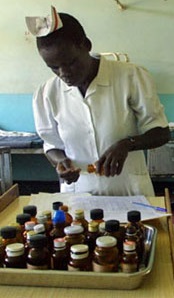Study shows special role for general care
 New research says non-specialist health workers play a big role in improving many areas of health for developing nations.
New research says non-specialist health workers play a big role in improving many areas of health for developing nations.
Nurses, GPs and other non-specialists can have a clear effect on people with depression, anxiety, dementia, maternal depression, post traumatic stress disorder and alcohol abuse in developing countries – where there is often a lack of mental health professionals – according to a new review.
In the first ever systematic review of non-specialist health workers providing mental, neurological and substance-abuse (MNS) care in low and middle income countries, researchers found that non-specialist health workers were able to alleviate some depression or anxiety.
Examinations of 38 relevant studies from 22 developing countries showed that for patients with dementia, non-specialists seemed to help in reducing symptoms and in improving their carers’ coping skills.
The study says non-specialists may also have benefits in treating maternal depression, post traumatic stress disorder as well as alcohol abuse, though the improvements may be smaller.
Lead author Dr Nadja van Ginneken, who completed the research at the London School of Hygiene & Tropical Medicine's Centre for Global Mental Health, said: “Many low- and middle-income countries have started to train primary care staff, and in particular lay and other community-based health workers, to deliver mental health care. This review shows that, for some mental health problems, the use of non-specialist health workers has some benefits compared to usual care.”
Vikram Patel, Professor of International Mental Health at the London School of Hygiene & Tropical Medicine, said: “This review's primary message is that non-specialist health workers have an important role to play in delivering interventions for a range of mental disorders and can thereby play a key role in addressing the human resource shortages in mental health care in low- and middle-income countries.”
The research showed promise in using non-specialist health workers to boost mental health outcomes in developing countries, but the authors note that more evidence is needed in this area as many studies were of low quality.
The study has been published online, and is accessible here.







 Print
Print